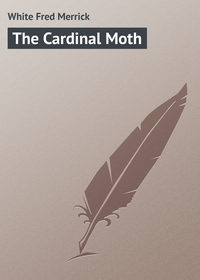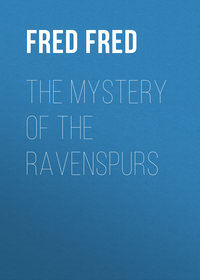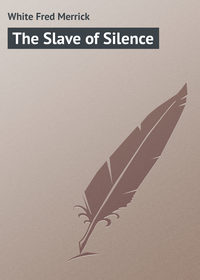 полная версия
полная версияThe Weight of the Crown
There was a cold, stinging contempt in Varney's tones by no means lost on the listener. Perhaps some sense of shame was stirring within him, for no reproof rose to his trembling, bibulous lips. Varney passed out presently, locking the door behind him as coolly as if he had been a gaoler. At the foot of the stairs a neat-looking footman was waiting with a parcel for Varney. As he took it Hope crossed the hall. There was a look of alertness, a desire for battle in his face.
"What is going on?" Varney asked. "Something seems to have happened?"
"Count Gleikstein is here," Ronald whispered. "The Russian chargé d'affaires, in the absence at St. Petersburg of the Ambassador. You can imagine what he has come for. There was a great battle of wits going on in the salon. The Queen of Asturia is talking to Gleikstein, and I have secured the presence of Prince Mazaroff. Lechmere looks anxious for the fray, and I should say from the expression on his face that he has a knife up his sleeve. If we could play some strong card – "
"We are going to," Varney snapped, as he hugged his bundle under his arm. "Only keep the ball rolling for another quarter of an hour, and I shall be ready for you. Listen!"
Very rapidly Varney whispered a few instructions into the ear of Hope. The latter grinned delightedly, then his face grew grave again. The thing was serious enough, and yet there was a fine element of comedy in it. It was diplomacy gone mad. On the hall stand was a stack of visiting cards. On one of them, chosen at haphazard, Hope wrote a message. He trusted that the queen would understand; in fact, he felt sure that she would.
The little group in the salon, under the famous Romney and the equally famous Velasquez, was a striking one – the Queen of Asturia, tall and stately, and smiling as if perfectly at her ease; by her side Count Gleikstein, the Russian chargé d'affaires, slim waisted, dark of face and stern of eye, yet with a waxed moustache and an air that gave a suggestion of effeminacy to him. Lechmere was lounging by in a listless kind of way, and yet from time to time there was an eager tightening of his mouth that proved him ready for the fray. Prince Mazaroff completed the group.
Ronald Hope came up with a respectful bow, and tendered the card to the queen. She glanced at it leisurely; her face betrayed nothing as she read the message and handed the card back to Ronald again. One grateful look flashed from her eyes.
"I regret that I cannot," she said. "I have so many calls of that kind on my time. If the lady is a friend of yours, Captain Hope, I may stretch a point in her favour. She may call on my secretary at eleven o'clock to-morrow morning."
Ronald bowed deeply as if charged with a message, and hastened into the hall. The card he tore into small fragments and cast into a waste paper basket under one of the hall tables. Then he went back to the striking group under the picture again.
"I am afraid that it concerns all of us," the count was saying in a dangerously insinuating voice. "Of course, one can hardly be responsible for what the papers say, but in the present dangerous state of public opinion in Asturia – the queen will pardon me?"
"I pardon anybody who does their duty to their country at any cost," the queen said. "If we could produce those papers that your royal master is so suspicious about – "
"Then I am to understand that some papers of importance have really been stolen?" the count said swiftly.
"On the contrary, you are not to understand anything of the kind," Lord Merehaven smiled. "My dear count, I could lead you a fine wild-goose chase if I chose to allow your imagination free run. As a matter of fact, the papers you allude to were in my own hands at seven o'clock this evening. It is hardly possible that they could have been stolen and their contents made known to an American paper within an hour from that time. So easy am I in my mind that I have not even sent down to my office to see if the papers are still extant. And when you see the King of Asturia – "
"But I understand that he has gone to Paris?" Count Gleikstein said, with a swift, meaning glance at the queen. "Of course, if his majesty were here, and could give us an assurance that he has in no way given his authority and let you know what I mean. I am afraid that those agreeable Bohemian excursions that his majesty is so fond of are not regarded in Asturia in the same liberal light that they might be. Still, your assurance, my dear Lord Merehaven, will not – "
"Will not weigh like that of his majesty," Merehaven said. "If he were only here – "
"He has been detained," the queen said, ignoring a meaning smile that passed between the count and Prince Mazaroff. "If I could only have a message – "
A quick, smothered cry broke from Mazaroff as he looked to the door. Gleikstein followed his glance, and his face fell wofully. The queen smiled and advanced one step towards the door. Her dark eyes were filled with a great and lasting joy.
"I think your kindness is going to be rewarded, count," she said. "Yes, I was not mistaken."
A tall footman in the doorway announced – "His Majesty the King of Asturia!"
CHAPTER XVIII
WATCHING
It was not difficult for Jessie to guess the identity of the man who addressed her. Only a man who loved and felt sure that he was loved in return would have spoken to a girl like that. This was Charles Maxwell beyond a doubt. Nice-looking enough, Jessie thought, with a pleasing, amiable face – perhaps a trifle too amiable, but there was no mistaking the power in the lines of the mouth.
"What are you doing here like this?" he asked. "Heavens! has all the world gone mad to-night?"
The bitterness of despair rang in the speaker's voice. Jessie noticed that Maxwell was dressed not in the least like men in his position usually dress at that time of the night. He wore a grey flannel suit and a panama hat pulled down over his eyes.
"I came on urgent business," Jessie said. "I presume that you are Mr. Maxwell?"
"Why should I deny it?" the other asked. "I am Charles Maxwell, and the most miserable dog in London. But I am forgetting. Why do you ask me such a foolish question, Vera?"
"Because I want to be quite sure of my ground," Jessie said. "And because I am not Miss Vera Galloway at all. If you look at me very closely you will see that for yourself."
Maxwell stared at Jessie in a dull, wooden kind of way, as if the whole thing were past his comprehension.
"Yes," he said, "there is a difference, but it is so subtle that even I should not have noticed it unless you had called my attention to it. But I know who you are now. You are Miss Harcourt, daughter of Colonel Harcourt, late of the – th. I have often told Vera of the wonderful likeness between you. If you should ever meet her in private life – "
"I have met her, I am personating her at the present moment," Jessie whispered.
"Amazing!" Maxwell exclaimed. "But I understood that you were – that you had been – in short – "
"Engaged in a Bond Street shop," Jessie finished the sentence. "So I was till to-day, when I was discharged through no fault of my own. Miss Galloway sent for me to take her place. Secretly I have played her part all this evening. And she went away dressed in my simple black clothes – "
"But why?" Maxwell demanded jealously. "Why all this absurd mystery?"
"Surely you can guess? Why do you look so suspicious? I am not altogether in Miss Galloway's confidence, but I understand that she wanted to save somebody whom she loved – somebody that was in trouble. It requires no great intelligence to guess that you were the person in question. It was all connected with those papers missing from the Foreign Office."
"I know no more about it than the dead," Maxwell said vehemently. "The papers in question – and others – were as much in Lancing's custody as mine. It was he who was to blame, though I admit that I locked the papers away to-night after Lord Merehaven had done with them. When I saw the Mercury I was horror-stricken. I guessed exactly what had happened."
"How could you guess what had happened?" Jessie asked.
"Because I have had my suspicions for some time," Maxwell said. "I dismissed those suspicions as unworthy of me and insulting to Captain Lancing. I know that he was greatly infatuated with Countess Saens, whom a Mr. Lechmere, a late Queen's Messenger, had warned me against as no better than a Russian spy. Lancing was mad over her. There is not the slightest doubt that she induced Lancing to let her have those papers to copy. Then she refused to return them, and Lancing committed suicide. That is what I make of it."
"The sensational report in the Mercury went farther than that," Jessie said. "It is assumed that you are a party to the conspiracy, and that you fled to Paris. Is that true, or going to be true?"
"As heaven is my witness, no," Maxwell said in a hoarse whisper. "When I had made up my mind what had happened, I determined to get possession of those papers. I vanished, saying that I was called suddenly to Paris. For the last four hours I have been dogging Countess Saens. I followed her here, and I am not going to lose sight of her until she is safely at home. And when she is once safely at home, I am going to do a desperate and daring thing. What is she doing here?"
Jessie made no reply for the moment. She had pulled her wrap over her face again so that she should not be recognized. She was watching the movements of Countess Saens breathlessly. The woman had passed up the steps into the big hall beyond the swinging glass doors. She seemed to be arguing with a porter, who shook his head in an emphatic way. Evidently the countess was angry; so much could be seen from her gestures and the shake of her shoulders.
"She is trying to see a patient at irregular hours," Jessie said, "and the porter is adamant. I pray from the bottom of my heart that she may fail."
"Is this another piece in the puzzle?" Maxwell asked hopelessly.
"It is the key-piece of the problem," said Jessie. "Ah, the porter is not to be moved. He has sent off an under porter, possibly to call one of the house surgeons. See, the countess sits down."
Surely enough the countess had flung herself angrily into a seat. Nobody seemed to care much about her, for she waited ten minutes without any sign of anybody in authority. Meanwhile Jessie was making Maxwell au fait with the situation.
"You threatened some dangerous and desperate enterprise a little later on," she said. "I suppose that is a supreme effort to try and get those papers?"
"You have guessed it," Maxwell said grimly. "If I could do that, the whole situation would be saved. We could do anything; we could point to Lancing's suicide as the result of reckless gambling. Mind you, that would be more or less true. If Lancing had not been desperately situated, he would never have yielded to the countess's fascinations and sold those precious documents."
"Yes, yes," Jessie interrupted. "But unless I am greatly mistaken, you have been forestalled. Somebody else has already removed the documents from Countess Saens's custody."
"You don't really mean that! What was it – a case of diamond cut diamond?"
"Yes, but not quite in the way you imagine. Those papers were stolen in turn from Countess Saens to-night, taken from a drawer in her bedroom by Miss Galloway."
Maxwell pressed his hands to his head. The situation was too much for him. He groaned for an explanation.
"I can only surmise," Jessie said. "But presently you will have to admit that I have very strong grounds for my surmises. In some way Miss Galloway obtained a clue to what was about to happen. That is why I was called in to take her place, so that she could have an hour or two without being suspected. An hour or so ago Countess Saens's maid came to Merehaven House with the information that there had been a burglary in the countess's bedroom, but that nothing besides some papers seemed to be missing. That those papers were important could be guessed by the ghastly yet furious expression on the lady's face. The maid was pressed for a description of the thief – who, by the by, was a woman. And then and there the maid pitched upon me. She declared point blank that it was I who committed the burglary. What do you think of that?"
"You are a clever young lady," Maxwell said hoarsely. "Pray go on."
"The maid stuck to her guns, though everybody laughed at her. She said the thief was dressed in plain black, and as I was in evening dress, and had been seen all the evening, those who heard were amused. But I understood. In my plain black dress Miss Galloway had gone to the countess's house and stolen those papers. The thing was as clear as daylight to anybody behind the scenes. Under the circumstances, your prospective burglary would be so much loss of time."
"I quite understand that," Maxwell muttered. "It is exceedingly clever of you to read between the lines so clearly. Vera has done this for my sake. But how did she know – how could she possibly tell what was going to happen, and when those papers were to be found? Of course, I guessed where the trouble lay directly I saw the Mercury paragraph, but Vera! And she never takes the slightest interest in politics. What are you looking at?"
Once more Jessie was staring intently past the swinging doors of the hospital into the big hall beyond. The countess had now risen from her chair and was facing a little man with a bald head and gold-rimmed spectacles, who appeared to be explaining something to her. Jessie could see him bow and shake his head. Her breath came very fast.
"Why are you so interested in the countess's present action?" Maxwell asked.
"Because she has come here to try and see a patient," Jessie whispered intently. "From the bottom of my heart, I pray that she may fail. If she succeeds we are ruined, you are ruined. For the patient is no other than Vera Galloway."
CHAPTER XIX
THE QUEST OF THE PAPERS
"I suppose I shall be able to take it all in presently," Maxwell said feebly. "Vera is a patient here, and the countess has come to see her. But would you mind explaining to me why Vera is here, what has happened to her, and what that fiend of a woman desires to know?"
"It was a case of cruel misfortune," Jessie said. "Miss Galloway was knocked down by a passing cab in Piccadilly and brought here. She was not so badly hurt, because she had the sense to call herself by my name. Besides, Dr. Varney saw her here. And Dr. Varney discovered my secret, so that I was obliged to confide in him. Now do you see?"
"I can't see where the Countess Saens comes in," Maxwell murmured.
"You are not very wise or long sighted for a diplomatist," Jessie said with a faint smile. "Don't you see that the countess's maid's suspicions fell on fruitful soil? When she left Merehaven House for her own, she discovered the full significance of her loss. Then she began to put things together. She had an idea that a trick had been played upon her. She had the police in – "
"Yes, but how did she discover that anybody answering to Vera's description was here?"
"Easily enough. Her maid gave the description of the thief. Then the police began to make inquiries. They discover that a girl in black answering to the maid's description has been brought here after an accident. They tell the countess as much. The police don't worry about the matter for the present, because their bird is quite safe. But that is not good enough for the countess. She comes here to make sure for herself; she suspects the trick."
"I confess that you are too clever for me," Maxwell sighed. "And yet everything you say is absolutely clear and convincing. I am afraid that there is still further trouble looming ahead. How did you get to know what had happened?"
"Miss Galloway sent me a message by a district boy. The idea was that I was to try and see her without delay, and go on playing my part until we could resume our respective personalities. Without some further coaching such a thing was impossible. I took Dr. Varney into my confidence, and he gave me a permit to see Vera Galloway to-night. I am here at considerable risk, as you understand, though I have prepared for my return to Merehaven House. Ah, she has failed."
The countess was standing up and gesticulating wildly before the little man in the gold-rimmed glasses. He seemed to be profoundly sorry, but he was quite firm. He signalled the porter, who opened one of the big glass doors and signified that the countess could depart.
"Even her fascinations have failed," Jessie said. "Please let me go, Mr. Maxwell. If I am recognized now everything is ruined. And you had better not be seen, either."
"Every word that you say is replete with wisdom," Maxwell said. "One moment. I must see you again to-night and know how things are going. Will you meet me in an hour's time in the garden at the back of Merehaven House? Don't say no."
"If it can possibly be managed," said Jessie. "Now I must go. You had better get into the shadow across the road. I feel that all is going to be well yet."
Maxwell lounged away, and Jessie passed quickly along as the countess came down the steps and stepped into her brougham. Jessie waited to see the flashing equipage drive away before she turned again and in her turn mounted the steps of the hospital.
Jessie boldly demanded to see a patient named Harcourt, and thrust her permit into the porter's hand. He looked a little suspicious over this fuss about a mere patient, but the name on the permit had its force, and presently Jessie found herself entering one of the wards under the charge of a nurse. The nurse glanced at Jessie's half-concealed face, and came to the natural conclusion that here was a sister of the latest accident case. Under the circumstances, she had no hesitation in leaving Jessie and Vera Galloway together.
"Thank Heaven you have come!" Vera whispered. "No, there is not much the matter. I suppose I must have fainted at the shock and the pain, but the doctor says I shall be out in two or three days at the outside. It is a case of bruised tendons more than anything else. You dear, brave girl!"
The dear, brave girl forced a smile to her lips. All the same, the prospect was alarming. It was one thing to carry this imposture through for an hour or two, but quite another to keep the comedy going for some days longer. But audacity carries such things through.
"Tell me everything that has happened," Vera went on. "Don't let us dwell on this cruel misfortune. Everything seemed going so well when that wretched cab came along. Perhaps I was dazed by my success. I know that I was shaking from head to foot … but that mattered to nobody but myself. Tell me."
Jessie proceeded with her story. She had a deeply interested listener. Vera turned from side to side and her face grew pale as she listened to the amazing story that Jessie told her.
"So I am in danger," she said. "The countess suspects. And it was all true, all about Charles and Captain Lancing. I heard that as I came along. If I could only see Charlie – "
"I saw him not five minutes ago," Jessie said. "Perhaps I had better finish my story, and then you can ask any questions you like afterwards."
Vera composed herself to listen with what patience she could. Her white face was flushed and hot before Jessie had finished. The latter looked uneasy.
She was evidently uneasy in her mind about something.
"I am afraid that I must ask you to confide in me more fully," Jessie said. "Presently I will ask you to give me a few simple instructions whereby I can keep in touch with my position. But you will recognize the danger, both to you and myself. The countess has her suspicions aroused, as I have told you. Now tell me, did you visit her house to-night? Were you the burglar, so to speak, who – "
"I was. I may as well admit it to you. It was the matter of the papers. You see I knew – "
"Yes, but how did you know?" Jessie persisted. "You saw me this evening quite early. At that time those papers were quite safe at the Foreign Office. How could you tell then that they were going to be stolen, or rather, conveyed to Countess Saens? And if you knew that the robbery was going to take place, why did you not warn Lord Merehaven? Or better still, tell Mr. Maxwell what you had discovered?"
"I could not get in touch with Charlie at that moment," Vera said, speaking as if with difficulty. The tears had gathered in her eyes. "There was no time to be lost."
"I am still very much at sea," Jessie said gently. "What aroused your suspicions?"
"Yes, I had better tell you everything," Vera said in a firmer tone. "You have been so good to me, you are so loyal and brave. There never was anybody so good to a stranger before."
"No, no. I did it all for money. It was because I was so desperately placed – "
"It is nothing of the kind, Jessie, and you know it. You would have done the same for me in any case – I feel certain that you would. My first suspicions were aroused by a letter which came into my hands. It was evidently sent in mistake, and written by Charlie to Countess Saens. It seems as if the two had struck up a violent flirtation together. If I cared less than I do for Charlie – "
"I would not let your mind dwell on that," Jessie said soothingly. "When you get to the bottom of this business you will find that there is some plan on the part of that infamous woman. May I ask you whether that letter was an admission of guilt on the part of Mr. Maxwell, or – "
"It might have been. In the light of recent events it certainly looks like it. But pretty well everything is capable of explanation, as you know. I shall possess my soul in patience… I am so dazed and confused now that I do not seem able to think clearly. But when I sent for you I could see everything as clear as crystal before my eyes. If I had not met that cab everything would have been all right, and you would have been back at home by this time and nobody any the wiser."
"Then you were quite successful?" Jessie asked eagerly.
"Absolutely successful. I can't think now how I had courage to do it. Once I got going, my nerves never failed me for a moment. You see, I know that house where the countess lives; I have been there so many times before. And I felt so strong and resolute, especially when I passed the porter and he did not make any protest. But the rest you already have from the Countess Saens's maid. It was a sheer piece of bad luck finding her there at all."
"And you got safely out of the house with those papers? That was a bit of good luck indeed."
Vera Galloway smiled. A sudden idea came to her – the idea seemed to come to both girls at the same time. It was Jessie who put the question.
"And where are the papers now?" she asked. "You had better let me have them."
"Have them!" Vera echoed blankly. "Where are they? Don't say they were lost after I fell under the cab!"
There were no papers anywhere to be found.
CHAPTER XX
A SPECIAL EFFORT
Cool hand as he was, even Lechmere glanced with astonishment at the King of Asturia. The ruler was small and mean-looking generally, but now he seemed to be transformed. Varney's drug must have been a powerful one to make that difference. For here was a king – a boy specimen with red hair, but a king all the same. Count Gleikstein flashed a furious glance at Mazaroff, who merely shrugged his shoulders. But he was puzzled and annoyed, as Lechmere could see from the expression of his face. The comedy was a pleasing one for the old queen's messenger.
The great salon was still well filled by Lord Merehaven's guests, for this was one of the functions of the season, and few people were going farther to-night. It was known, too, that the great diva also had captured all hearts and was going to sing again. Therefore the big room, with its magnificent pictures and china and statuary gleaming with hundreds of electric lights, was still filled with a brilliant mass of moving colour.
A thrill and a murmur had run round the brilliant assembly as the King of Asturia came in. There had been many rumours lately, but nobody quite knew the truth. The King of Asturia had either abdicated his throne or he had been deposed by a revolution. The papers had been full of gossip lately, for the Queen of Asturia was a popular figure in London society, and people were interested. It was for this reason – it was for the sake of necessary people that Lord Merehaven had hoped to have seen his royal guest earlier.






